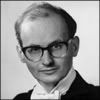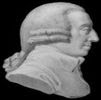As i've explained civil rights without the need of a god or a religious belief, if you want to defend that there's a need for a god in order to support civil rights, you should point out the errors of my arguments.
Ok, so if I got your argument down correctly, you are saying that civil liberties 'developed' with economic progress. Sure, granted, but this is simply a historical correlation.
Then you went on to say that these civil liberties are granted; and if they weren't it would be 'inhuman'.
Ok, what do you mean by inhuman? You are making a tacit moral assumption here without really explaining yourself.
hat's a rather absurd notion imho. I once listened to a radio talkshow who had invited the bishop of Wuerttemberg, Eberhard Renz (back then).
The issue at question was why god allowed man to do evil if god could just "make man do good". The bishop's reply was (paraphrasing) that god didn't intend man to be his puppet but rather make his own choices - actually choose between good and evil.
To me, this seems to contradict the idea of an individual being property of god, as well as the idea of doing god's will "because he told me to".
Man is self-governed, responsible for his own actions, and therefore also holder of his own property rights.
Locke did not say that man was NOT the holder of his own property right. Locke agreed that man has ownership in himself. I am not making any absurd notions, I am simply stating what Locke said (and he is, after all, the founder of liberalism and pretty much the father figure of the federalists, the levellers, etc). Now if you want to understand the difference between property in the state of nature or civil society and property between God and man, you need to look at Locke's
Essay Concerning Human Understanding where he makes an explicit difference between the labor of man and the labor of god. So when god labored for 7 days and
created man, man was the property of god, but endowed with reason as to know the moral laws of god in nature (the law of nature) from which man derives his property right through and extension of his applied labor. Reason is free, and as such man can appropriate his own property, including himself (but he still remains a property to god, but NOT in the same sense that an acre of land is your property or in the sense that you yourself are your own property and subject to your own reason).
However, that said, Locke needed this argument in order to claim that you cannot dispose of yourself. Remember, any property can be used and disposed of to the will of the owner. But your own self has a different relationship because you were a creation from god, therefore you are obligated to god in the sense that you are obligated to preserve yourself. So you cannot commit suicide.
If you are obligated to preserve yourself, then - Locke claims- god made lands in common but endowed man with reason to appropriate property in the natural world so that man can survive and preserve himself.
This is how Locke derived the law of nature. And if you continue reading Locke's
Second Treatise of Government You will understand that it is by natural law (property rights) that all civil rights are derived.
That said, we understand how Liberalism created the notion of individual rights (whether civil or natural) by inferring an obligation to god. My point is, can you guys think of any way to justify individual rights WITHOUT an obligation to god? That is, can you assume that you have the right to kill yourself (dispose of your own property) and still infer a right to property?
If not, well, Liberalism as I stated is a colossal failure. As I have held for a long time.



















 Asking why we think we own ourselves is like asking why we think we think... basically it's just a very useful assumption
Asking why we think we own ourselves is like asking why we think we think... basically it's just a very useful assumption 







 - By wat0n
- By wat0n